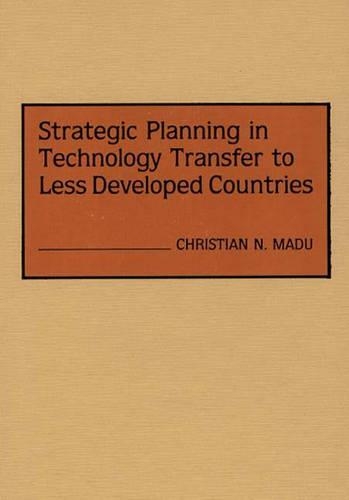
Strategic Planning in Technology Transfer to Less Developed Countries
(Hardback)
Publishing Details
Strategic Planning in Technology Transfer to Less Developed Countries
By (Author) Christian Madu
Bloomsbury Publishing PLC
Praeger Publishers Inc
27th January 1992
United States
Classifications
Tertiary Education
Non Fiction
Development economics and emerging economies
338.926091724
Physical Properties
Hardback
224
Description
Despite an avalanche of literature over the past 30 years there has been relatively little written on the role played by strategic planning in the transfer of technology, particularly from developed to less developed countries. Technology transfer, which involves the acquisition of "inventive activity" by secondary users, is conceded vital to socio-economic growth, but usually it is looked at internationally from a micro perspective. Unlike other books, Madu's volume looks at technology transfer "holistically". It examines the advantages of technology transfer and its limitations by viewing recipient nations as systems, in which social, economic, behavioural, and political influences converge to help shape technological decisions. Only when a systems perspective like this is adopted and technology seen as a strategic variable can technology transfer be understood and successfully implemented, says Madu. Madu thus identifies the failures of technology transfer as the result of "malfunctions" in three components of the "system": technology, structure, and behaviour. He analyzes these malfunctions from the viewpoints of both transferrer and receiver, whose missions, goals, and objectives are often not only disparate but sometimes in conflict. He then offers what he calls "prescriptive frameworks and guidelines" to help implement transfer, and to see it as a variable that must be integrated into national development planning. Throughout, Madu makes it clear that the objective of technology transfer is "the maximizing of social welfare". Using this overarching premise he is able to evaluate both the benefits and the social costs associated with technology transfer ad to develop his prescriptive, integrative models. Intended for specialists in international finance and development and international business management, Madu's book, should be of special value to teachers of graduate courses in socio-economic development, public policy, and economics, and to policymakers throughout government.
Author Bio
CHRISTIAN N. MADU is an Associate Professor of Management Science at Lubin Graduate School of Business, Pace University. His articles on technology transfers have appeared in journals such as Long Range Planning, Futures, Technological Forecasting and Social Change, Journal of Technology Transfer, and Engineering Management International. He presently serves on the editorial review boards of The Mid-Atlantic Journal of Business and Engineering Management Journal.
